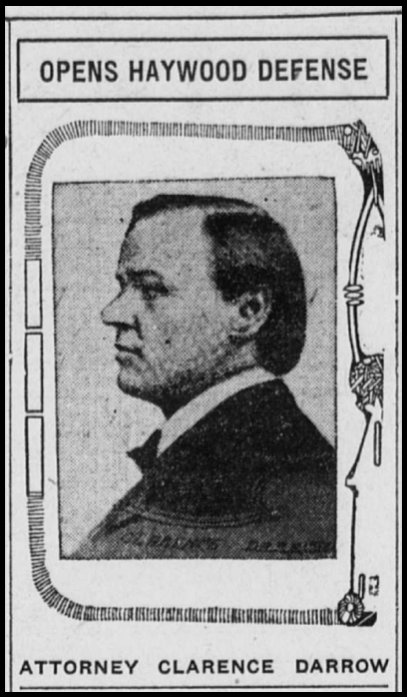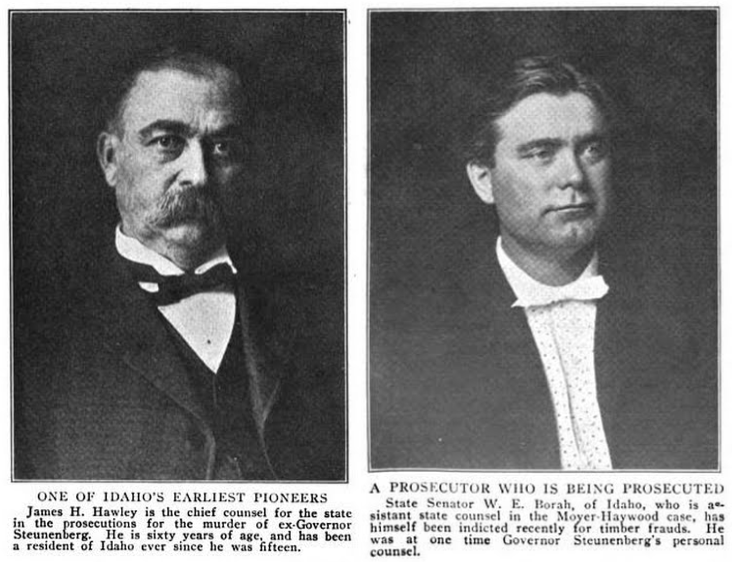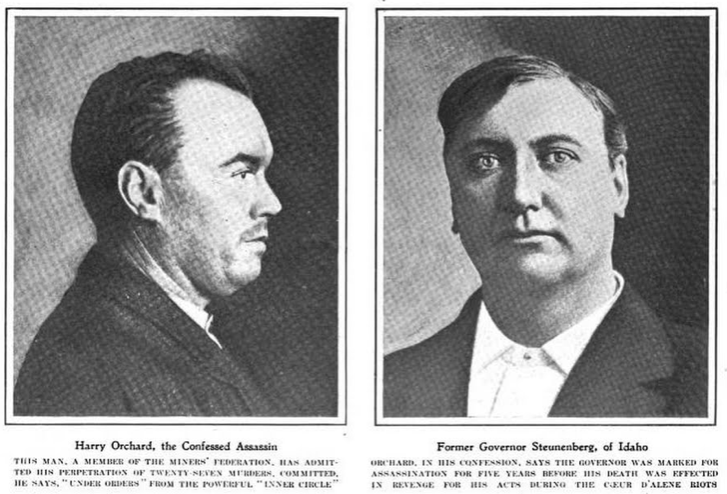the skin and the bone?
-Billy Bragg
Hellraisers Journal, Friday June 28, 1907
Boise, Idaho – Clarence Darrow Opens for the Defense
From the Montana News of June 27, 1907:
Darrow’s Statement
—–Address to the Jury Outlining
Plans of Defense
—Orchard Spends Sunday Auto
Riding in BoiseSpecial to the Montana News—
Boise, June 24.
At the call of the defense attorneys the Federation men who are to appear as witnesses have come pouring into Boise the last few days. It seems good to see them here—all the old stand-bys that have so valiantly fought the struggles of the western labor for the last ten years. D. C Copely, formerly of the executive board, now a mine owner in Nevada; A. H. Floaten, candidate for governor of Colorado on the socialist ticket; Deportee from Telluride, a merchant who has been through the fiercest of the fight for his convictions; J. C. Barnes, who was up in a tree in Telluride, while the militia were hunting him underneath; John M . O’Neill, W. F. Davis, M. E. White, one after another. The very backbone of the Federation, fine, able, brainy men, more than a match for any capitalist prostitute that can be marshalled against them.
And they are here with the goods, the truth, the eternal fight against the injustice of employers, and the reasons for that fight. As one of them said:
We are here to go to the river, our cause is right and we’ll stay with it.
Almost without exception these strong, active men are socialists.
Orchard Paraded.
A radical change of policy is being employed toward Orchard. He is being paraded before the public by the paid henchmen of the mine owners. Bob Meldrum, with three others of his aids, is riding Orchard about town in an automobile. He was out to hear the band concert Saturday night. All day Sunday he was in Hawley’s office, sitting at a window and watching and reporting on his witnesses for the defense as they passed.
Why this change of policy in regard to a creature that has been kept secret as the tomb for seventeen months? Is the prosecution setting another trap for the members of tho Western Federation? The friends of the defense have every reason to desire that Orchard be safely and securely guarded. Should anything happen to that depraved character, with what instant effect would its cause be laid upon the Federation, and even so his public showing is a tremendous temptation to some whose loathing and hatred for the reptile because of the injury he has sought to do them, might get the better of their judgment. The defense has a right to protest vigorously against this public exhibition of the wretch used as the greatest weapon against the union.
Darrow’s Statement.
This morning Mr. Darrow began his statement to the judge of the plan of the defense. The address lasted through both sessions of the day and was the clearest and most concise presentation of the case that has yet been made. Mr. Darrow began in his easy, argumentative way, without any flourishes, relying solely upon the facts that he had to present.
He said in part:
You have listened to the evidence of the state. You must wait to hear all before you draw your conclusions, till the last word has been spoken. You have the evidence and the theory of the state. You are now to hear our side of the story.
Nominally William Haywood is on trial charged with the murder of Governor Steunenberg. There must be some nominal charge. But the true issue is wider.
Mr. Hawley stated it in his opening address. We must follow the ground they have taken us over.
He told you the officers of the Western Federation were in a conspiracy to kill, that the murder of Steunenberg was only an instance. He told you that the Western Federation wished to control politics also, that large amounts of money were set aside to hire lawyers. This is partly true.
It is true that there is a labor organization called the Western Federation of Miners. It was born in 1892 and 1893, in the cell below this court room, in tho cell where other men are waiting for trial. Ed. Boyce and others were then in jail. They hired the best lawyers they could. They hired Hawley. He was the godfather of the organization and its first attorney. If there was anything criminal in appropriating money to pay attorneys the miners didn’t know it. They formed an industrial organization. It was to organize the men who did the work—as a benefit for the men and their families. It took some part in politics. It is to be hoped that the state will not hang these men for that. If such could be done, most of the corporations in the United States would hang.
The organization tried to help elect officials and judges that looked at things from the standpoint of the man with the pick and shovel. They tried to elect Hawley to the senate.
We plead guilty to politics. But there never was criminal conspiracy connected with the Western Federation. We do not claim that these men never did any wrong. They are not angels. Angels do not work in mines. They are the mine owners.
We are not here to apologize for the W. F. of M. It has always been a fighting organization and if it dies it will die fighting. From the first it met with opposition from the mine owners’ association, which was organized before the W. F. of M. was born. Before the Federation men worked from ten to fourteen hours in the mine, and the same time in the smelters, where the average life is seven years, where the teeth fell out and the men became paralytic from the poisonous gases. They were compelled to buy whatever they used at the company store, to employ company doctors and to be cared for at a company hospital, the machinery was unsafe and the smelters vomited forth poison and death.
The new organization began at once to correct these evils. It took care of its widows and orphans. One union, that of Butte, had paid out more than a million dollars to the widows and orphans of its members. Lead City had done the same. It began to press legislation for safety appliances and an eight-hour day. Its activities show that the members had associated with some one besides Orchard. Agitation was commenced in all states for an eight hour law. The wages of the men were raised. Hospitals, halls and libraries were established. Some of the unions owned the best property in their town.
All this had happened since Mr. Hawley had organized them into a ‘ compact mass of men.
The organization met the constant opposition. It was always in trouble. Organizers going into towns would be met by tho most stubborn resistance from the owners and bosses of the miners. Men were ordered not to attend the meetings. In certain camps the president of the organization could get nothing to eat at the boarding house, nor a night’s lodging.
The members were arrested on the slightest charge, ninety-nine out of one hundred never had the grace of a trial so we can’t complain in this case.
The mine owners did everything in their power to destroy the organization. They hired the Pinkerton detective agency with one McParland at the head. These people were busy following sleuthing, working and lying against the members of the union. Hired detectives were placed in positions of trust with orders to cause strikes and advise violence. They did this in Telluride and Cripple Creek, where the Pinkerton men were the chief factor in the disturbances. A campaign of slander and abuse was commenced against the union men. Every crime in the west was ascribed to them. Every illegitimate child born west of the Mississippi river was carried to Denver and laid on the door step of the W. F. of M.
They did establish a magazine. It has been running ten years. It is possible that in that time some foolish things have crept into it. It would be different from all other publications if they had not. Haywood paid little attention to the magazine. Moyer gave it little attention. He was busy. The writing in it was not so polished as that of Mr. Hawley and Mr. Borah. The contributors did not have a college education. They were working men. It was published to help the organization along. There were appeals for political action. The miners had a right to make them.
The union went along allright down to 1899, to the time of the troubles in the Coeur d’Alenes. The men were at work and the organization was flourishing. Then came the strike. A train was run to Wardner with a thousand men on it who were without direction. The mill was blown up—we believe with powder furnished by a rival company.
Harry Orchard, who had been carrying a union card for thirty days, says he did it. Simpkins was then in the Coeur d’Alenes. There was a call for the military and Steunenberg sent the troops in. His action was condemned by the minors and many others.
Simpkins lay in the bull pen for many months suffering all sorts of indignities. He was stood up to a post and a bayonet run into his breast by a colored soldier.
Orchard was there—a shoestring gambler. He never worked for any length of time since he collected money on some cheese factory. He put in some time prospecting and acquired an interest in the Hercules mine. He borrowed money to keep the mine, and finally took a deed for his interest. Orchard always put a high value on this property, and stayed around the Coeur d’Alenes hoping to redeem it. He had another incentive to desire riches. He had left home with another man’s money and another man’s wife. This woman afterwards went home because he could not support her with the understanding that she would return if he ever got money enough to care for her. It was said she was the only woman Orchard ever loved.
The defense will show that Orchard had nothing to do with a number of crimes he said he committed. We hate to take the bloom off such a peach as Orchard, but we will show that he is tho most monumental liar that over lived if he is not the greatest criminal. We will convince even Mr. Hawley of this before the first witness leaves the stand. We shall prove this by twenty or thirty witnesses. Some of them are miners, but not all. We will bring on eminently respectable people who never did a day’s work in their lives.
One would have thought that Orchard started the earthquake if he had been in San Francisco. He has always been a traveller—a few days, months, or weeks, at this place or that—the gentleman miner who mined the miner. His interest in the Hercules mine would now be worth about half a million, but he would rather have what he’s got.
Haywood was a plain ordinary miner who lived at Silver City in sight of these mountains where they are trying his case. He was born here. His ancestors came here before the revolution. His people were poor. He had to work. He had no other way of making a living. He joined his union, became local secretary, and used to write resolutions on a powder keg in the mine.
Like all the minors and many others he did not believe in martial law. He stumbled along, drilling, until he became secretary-treasurer of the W. F . of M. Moyer was working in Lead [South Dakota]. He was a man of force and became president of the union. Pettibone was selling wringers in a store in Denver. He had been a miner, had worked in the Coeur d’Alenes, and was interested in his local union. Hawley got him out of jail, and he left the life of a miner for a more quiet one. It was too dangerous.
Orchard finally landed in Cripple Creek where be played cards and high graded. He got into the unions. Other men were then paid by the Pinkerton Detective agency. He was brought to Denver on a pass by a detective the first time the defendants saw him. Cripple Creek was the Waterloo of the W. F. of M. They had halls, stores, libraries and were doing some thing when they took a chance with the smeltermen’s strike of Colorado City. Orchard was consorting with the miners, but doing something with the other side.
K. C. Sterling was doing the head detective work for the mine owners and citizens alliance. D. C. Scott was the chief detective for the Florence and Cripple Creek railroad, chiefly busied with the handling of ores. We will prove that Sterling, Scott and Or chard held conferences in a certain house. Orchard would come by night to see the detectives, sneaking up tho back way. We will show he was doing this up to almost the very night of the explosion. He could go through the military lines whenever he wished, and his house was not searched.
Evidence will be produced to show that the Vindicator matter was an accident. We will show that no conference ever took place between him and the defendants.
Mr. Darrow went into an extended account of the troubles in the Cripple Crook district, so the jury would be [?] He told how Orchard came to Denver with other deportees, changed his name, and left his trinkets and money in Pettibone’s safe. He said that depositions had been taken in California, among them Bradley’s, tending to show that the affair was a gas explosion. Orchard wove his story out of tho rumor that he had heard. While in California Pettibone sent him his union card, his masonic emblem, and some money. In coming back to Denver he boarded with the Adams, whom he had known. He was sleeping days and gambling at night.
He then followed Orchard on his tour to the killing of Steunenberg. He said Haywood would take the stand.
Neither the miners’ association nor a detective agency in all probability had anything to do with the killing of Steunenberg, but it was the result of Orchard’s private grudge. Orchard was caught red handed and persuaded by McParland to lay his crimes on someone else.
We will demonstrate to this jury that this is not a murder case, that Bill Haywood is not on trial, but that the state of Colorado sent these men here to break up the W. F. of M.
IDA CROUCH-HAZLETT.
———-
[Photographs added.]
SOURCE
Montana News
“Owned and Published by the
Socialist Party of Montana)
(Helena, Montana)
-June 27, 1907
http://chroniclingamerica.loc.gov/lccn/sn84024811/1907-06-27/ed-1/seq-1/
http://chroniclingamerica.loc.gov/lccn/sn84024811/1907-06-27/ed-1/seq-4/
IMAGES
HMP, Darrow Opens June 24th, LA Herald, June 25, 1907
http://chroniclingamerica.loc.gov/lccn/sn85042462/1907-06-25/ed-1/seq-1/
HMP, Hawley Borah, Current Lit June 1907
https://play.google.com/books/reader?id=f0lWAAAAYAAJ&printsec=frontcover&pg=GBS.PA592
HMP, Orchard, Steunenberg, Harpers May 25, 1907
https://play.google.com/books/reader?id=ErZCAQAAIAAJ&printsec=frontcover&pg=GBS.PA764
See also:
Darrow Collection: Haywood Trial
http://moses.law.umn.edu/darrow/trials.php?tid=3
Trial Transcripts, Haywood Trial, Volume 4, pp 1583-2123
June 18, 19, 20, 21, 24, 1907.
Note: pdf, slow to load.
http://moses.law.umn.edu/darrow/documents/Vol_4_Haywood_Transcript_p_1583_2123.pdf
The Cripple Creek Strike
A History of Industrial Wars in Colorado, 1903-4-5
Being a Complete and Concise History of the Efforts
of Organized Capital to Crush Unionism
-by Emma Florence Langdon
Great Western Publishing Company, 1905
(Search text with names mentioned above,
esp gunthug/detectives: Meldrum, Sterling and Scott.)
https://books.google.com/books?id=olgpAAAAYAAJ



